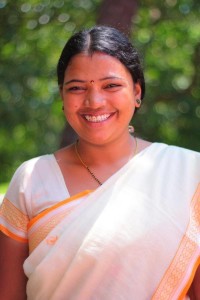 Rohini Pawar[/caption]
Rohini Pawar[/caption]
Four girls and three boys aged 12-15, were set to get married in a mass wedding in Walhe, a village on the outskirts of Pune– one of the fastest growing cities in the Asia Pacific region and one of India’s biggest education and IT hubs. Rohini Pawar, a 29-year old community journalist with Video Volunteers had seven days to stop it.
Married at 15, Rohini herself has seen the repercussions of child marriage closely. It marked the end of her formal education and crushed her dreams of becoming a doctor. “From being a school-going girl, I suddenly found myself living away from home, burdened with responsibilities. I was terrified at first,” she recounts. Not just Rohini, but two of her sisters were also married at the same age. “Back then, I wasn’t even aware that child marriage was prohibited by the law.But now that I am, I thought I must do something to stop it,” she says.
The practice of child marriage, although a criminal offence under the Prohibition of Child Marriage Act (2006), continues unabated across India. According to the 2011 census data 47% of those married in the country are children. A 2014 UNICEF study also pointed to early marriage being an impediment to education, which then leads to poor maternal and higher infant mortality rates.
Like several other communities across the country, child marriage is a common cultural practice amongst the Dombaris, a nomadic tribe, who traditionally earned a living through street performances like rope walking. “Every 2-3 years, there is one such mass wedding in my village,” says Rohini.
When she learnt about the impending wedding, Rohini made frantic phone calls to those within and outside of her community. Some suggested that she approach the police and have the parents arrested. Others asked her to stay out of the matter – “these are after all cultural practices of the community.” For Rohini, neither silence nor arrests were options. “What they really needed was counseling – somebody to help them understand the implications of early marriage – especially on a girl’s health and education,” she says.
Rohini and her social worker friend Vrushali Kaul came up with a plan. They would get the police to stop the weddings but convince them not to press charges. Several questions stormed her mind– what if their plan backfired? Who’d look after the children if their parents were sent to jail? What if her intervention caused more harm than good? Her initial apprehensions were put to rest when the police agreed to cooperate. With their help, Rohini was able to stop the child marriages.
[gallery columns="2" size="medium" ids="12136,12135,12133,12132"]
Above : Participants at the community awareness camp
They then organized a community awareness camp on the implications of early marriage. At the gathering of close to 40 people, several anxieties were expressed – What about the safety of our girls when we are away at work? What if she elopes? Conversations with parents also helped Rohini trace a strong economic l ink to the practice of child marriages amongst the Dombaris, most of who work as daily wage labourers at construction sites on the outskirts of Pune. “Having an unmarried girl in the house is looked at as an extra mouth to feed. While boys can start earning, girls have limited employment opportunities,” says Rohini.
The girls, however, expressed a strong desire to study further. Rohini’s next goal is to help them realize that dream. She is now working on convincing their parents to allow them to study further and gather support to enable them to do so.
****
Here’s how you can stop a child marriage:
- Report it to the local police station
- Report it to the District Magistrate
- Call Childline on 1098
- Write to the National Commission of Protection of Child Rights @cp.ncpcr@nic.in
Nupur Sonar is a Journalist. She works at Video Volunteers as a Trainer & Mentor.
Requesting financial assistance to build sanitised toilets
The Community Correspondent Nanu Kumari is talking to the Block officials now to arrange for financial assistance to construct toilets. Hope the residents of Murha Chhataun village do not have to face trouble and discomfort in their daily lives, this is their basic civil rights.
Video Volunteers Fixing the Gap between Community and Government
Our community correspondents operate as citizen journalists in their own community and bring the issues to the larger world through video reports. As a part of this process of transformation, we include government officials to play an important part.

